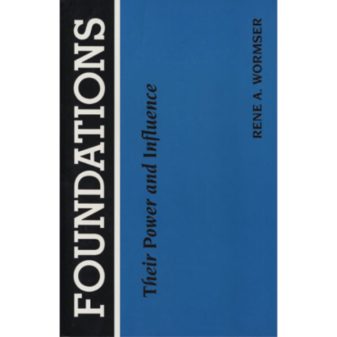Foundations: Their Power and Influence
$11.99
“Philanthropy,” Wormser warned, had become the mask of power. Drawing on the suppressed files of the Reece Committee, Foundations: Their Power and Influence uncovers how the vast fortunes of Rockefeller, Carnegie, and Ford were funneled into tax-exempt empires that financed radical education, manipulated social science, promoted globalism, and undermined free enterprise. With names, hearings, and interlocks laid bare, Wormser documents the rise of an unelected elite wielding billions beyond the reach of voters.
Description
“The incredible fact,” columnist John O’Donnell observed in 1954, “was that the huge fortunes piled up by such industrial giants as John D. Rockefeller, Andrew Carnegie, and Henry Ford were today being used to destroy or discredit the free-enterprise system which gave them birth.” That fact — and the fight to expose it — drives René A. Wormser’s Foundations: Their Power and Influence.
Serving as general counsel to the Reece Committee, Wormser had a front-row seat to one of Congress’s most embattled investigations. He shows how the committee’s work revealed not random charity, but a system: tax-exempt foundations acting as a self-perpetuating elite, funding social engineers, subsidizing collectivist textbooks, underwriting radicals in education, and even bankrolling propaganda for the United Nations. These institutions — Rockefeller, Carnegie, Ford, and their satellites — exercised unchecked cultural and political influence on a scale rivaling government itself.
The book names names and follows money. Chapters trace how the Social Science Research Council and the American Council on Education became conduits for shaping policy; how Dr. Kinsey’s “scientism” and Gunnar Myrdal’s An American Dilemma emerged from foundation dollars; how the Council on Foreign Relations and the Institute of Pacific Relations steered foreign policy toward “globalism.” Entire sections dissect the Ford Foundation as a gargantuan case study, from its behavioral science projects to its Fund for the Republic.
Wormser does not stop with exposure — he records the internal sabotage, the hostile press, and the procedural roadblocks that tried to strangle the Reece Committee itself. Appendices reproduce the committee’s suppressed findings, supplemental statements, and the “Dodd Report,” preserving evidence most Americans never saw.
For readers concerned with concentrated power — whether labeled “philanthropy,” “nonprofit,” or “tax-exempt” — this book is indispensable. It documents how unchecked fortunes can be weaponized against liberty, and why eternal vigilance remains the only safeguard. (1993ed, 412pp, pb)
You may also like…
-

Dollars and Sense (Cased)
$1.50 Add to cart -

Economics in One Lesson
$10.99 Add to cart -

Dollars & Sense: Solutions to the Economic Meltdown booklet
Price range: $0.99 through $1.95 Select options This product has multiple variants. The options may be chosen on the product page


